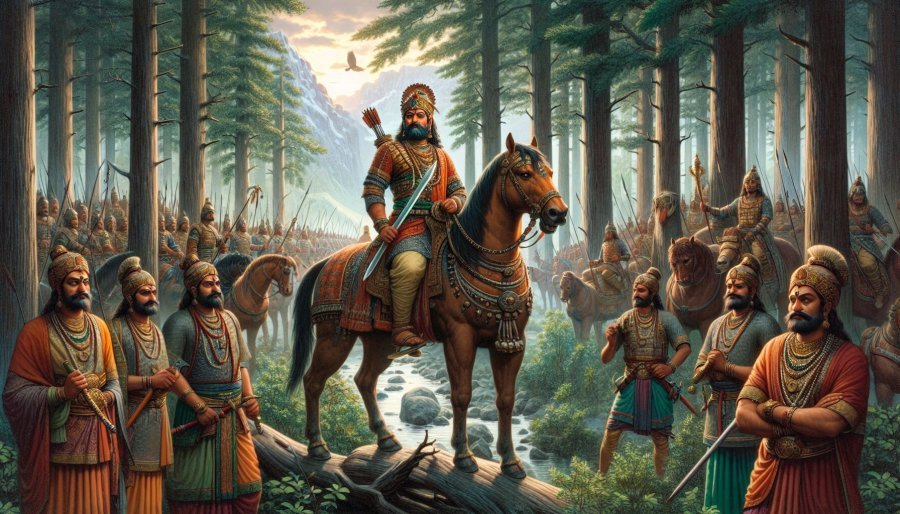Section CLXXVI - Story of Tapati: Origin of Tapatya Arjuna - Puranic Legend
Book index: Mahabharata (English)
This page contains a summary of the Mahabharata Section CLXXVI including examples of moral lessons in daily life. The Maha-Bharata is one of the largest epics ever written containing roughly 100,000 Sanskrit verses. It deals with the legendary history of ancient India and contains a large number of interwoven tales.

Short summary of the chapter:
The story begins with King Gadhi of Kanyakubja, who had a son named Visvamitra. Visvamitra had a large army and used to roam in the woods to hunt. One day, he desired to sport with his wife on a mountain he frequented, seeking permission from the sage Vasishtha who was like a father figure to him. Vasishtha agreed and allowed King Samvarana to enjoy time with his wife Tapati on the mountain, while he served as regent in the kingdom.
Samvarana and Tapati spent twelve years on the mountain, causing a drought in the kingdom as the god of a thousand eyes did not pour rain. The people suffered greatly, with starvation and death rampant. Vasishtha eventually brought the couple back to the kingdom, leading to the return of rain and abundance in the land. The capital and country were restored to prosperity, and the people rejoiced at the king's return.
Tapati, the daughter of Vivasvat, and Samvarana had a son named Kuru, who was a renowned ascetic. Arjuna, being born in the race of Kuru, was henceforth called Tapatya in honor of Tapati. The story illustrates the power and virtue of Vasishtha, the love between Samvarana and Tapati, and the lineage of Arjuna tracing back to this ancient history. It highlights the importance of righteousness, sacrifice, and the interplay between divine forces and mortal actions in shaping destinies.
Full English translation:
This page is merely a summary which is automatically generated. If you are looking for authentic sources such as the Sanskrit text or the Full English translation of Mahabharata Section CLXXVI - Story of Tapati: Origin of Tapatya Arjuna - Puranic Legend, have a look at the following articles:
Section CLXXVI, online text
English translation by Kisari Mohan Ganguli.
Read this and other chapters online.
Mahabharata (English Summary)
by Kisari Mohan Ganguli | ISBN-10: 8121505933
Buy the latest edition:
FAQ of Mahabharata, Section CLXXVI:
Who was the virtuous king mentioned in the story of Tapati?
King Gadhi, the son of Kusika, was the virtuous king in the story.
What caused the severe drought in the capital and kingdom of the monarch?
The drought was caused by the absence of rain for twelve years.
How did Vasishtha help in bringing an end to the drought and famine?
Vasishtha brought back King Samvarana and his wife Tapati to the capital.
Daily life: Story of Tapati: Origin of Tapatya Arjuna - Puranic Legend:
The story shared from the ancient texts underscores several timeless principles that can be beneficially incorporated into our daily lives. First and foremost, it highlights the importance of responsibility and leadership. Just as King Samvarana returned to his capital to alleviate the sufferings of his people, we too should understand the impact of our presence and actions within our communities. Acknowledging our roles and taking active steps towards making a positive difference can lead to collective betterment.
Another key lesson is resilience and hope. The kingdom faced a severe drought, and the people suffered immensely. However, through perseverance and the eventual return of their king, survival was possible, and prosperity was restored. This teaches us that no matter how dire our situations may seem, there's always a possibility for revival and growth. Maintaining hope and working towards solutions, even in the face of adversity, is crucial.
The story also emphasizes the value of nature and its interconnectedness with human well-being. The absence of rain led to despair, highlighting our dependence on natural resources. In our daily lives, it’s vital to cultivate respect and care for the environment, recognizing its role in our sustenance and survival.
In essence, the narrative from the past provides guidance on leadership, hope, and environmental stewardship. By embodying these values, we can create a more harmonious, resilient, and prosperous life for ourselves and our communities.
